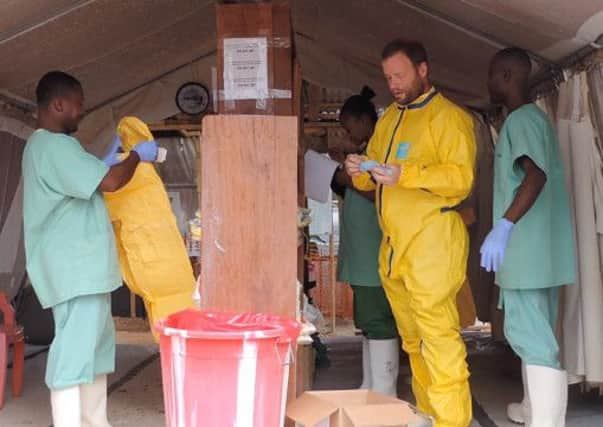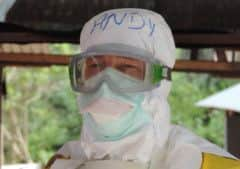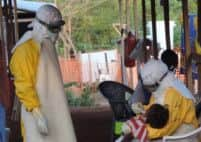Ebola nurse - ‘Crisis hasn’t gone away’


Andy Dennis, 48, a nurse at Harrogate Hospital spent five weeks working at an Ebola Medical Centre for Medicine San Frontier (MSF or Doctors Without Borders), arriving home a week before Christmas.
He said: “It is quite a thing coming back at this time of year. I’m finding it is the nice things about Christmas which are upsetting me the most.
Advertisement
Hide AdAdvertisement
Hide Ad“Things like the Christmas decorations are upsetting me when I think of the people I met who aren’t going to see them.


“I am lucky, I have a really sensible group of friends and family and colleagues who are great at welcoming me back and settling me in.
“It is taking longer to settle back this time.”
Andy has volunteered with MSF several times, working in Uganda in 2005 and South Sudan in 2008 and 2013, but said working in Sierra Leone was particularly challenging.
“It was the most emotional for sure. I was desperate to go, I felt if I didn’t put myself forward I couldn’t live with myself.”


Advertisement
Hide AdAdvertisement
Hide AdOver 70 patients were receiving treatment at the medical centre in Kaliahun, eastern Sierra Leone, when Andy arrived. The medical centre was close to the border with Guinea, but was treating patients from across the country.
Andy said: “Patients were travelling six or eight hours across the country to get to us, sometimes people died before they reached us. There just aren’t enough Ebola centres opening, the international effort hasn’t gone far enough yet.”
The full protective suit which medical staff wear takes an exhausting 10 minutes to put on and take off before and after every shift.
Andy worked early morning shifts to avoid the heat of the day, he added: “Every blood sample I took I had to think no one has ever survived a needle stab infected with Ebola, I had to remind myself of that every single time.”
Advertisement
Hide AdAdvertisement
Hide AdOne of the regulations volunteers must stick to is no physical contact with other people in Sierra Leone.
“There was no physical contact at all for five weeks, it was very difficult. As a nurse what I want to be able to do is comfort people who are suffering. Putting a hand on their arm to let them know I feel their pain, I understand. It isn’t the same through layers of plastic.”
Andy said Ebola health warning posters were visible all over the country and there w health checkpoints all along the roadside.
He said: “It is becoming well known, even the little kids, even toddlers, know not to try and hug you, they say ‘no touching, no touching.’ But it is still very tough for the people of that country, they have to break their traditions.”
Advertisement
Hide AdAdvertisement
Hide AdAndy worked alongside doctors from across the globe, and local staff from Sierra Leone.
While working in the medical centre, Andy bonded with a two-year-old girl named Fatamata who died after 10 days in the medical centre.
“She is one of the most moving things that has every happened to me. Her grandfather brought her in to the centre, but he wasn’t admitted. Both of her parents had died, she was on her own. Me and my colleague became very attached to her, as did the other ladies on the ward.
“She died after 10 days in the medical centre, me and my colleague took turns in holding her. We both felt it was very hard, it was upsetting. She is the one person I keep thinking of, I see Christmas lights and toys and know she will never get to see them, it is difficult.”
Advertisement
Hide AdAdvertisement
Hide AdDespite the heartbreak, Andy said he saw more people surviving the illness than not.
“The youngest survivor was two months old, the oldest was in their 80s. Ebola is not a disease which discriminates, it isn’t like other illnesses when you have a better chance of fighting it if you are young and fit and healthy. I saw young lads in their twenties, fitter than I have ever been in my life, die.
“But the successes are many, I remember one man, Ishmail, in his early twenties. He had a great smile and told me he had the best hair in the medical centre. He was just a great guy.
“Giving him his certificate of discharge was a great moment, it is amazing to be able to give someone that.”
Advertisement
Hide AdAdvertisement
Hide AdHe added: “Another positive memory was having a birthday party for a little boy called David who turned six, I took in balloons, we sang happy birthday to him and he seemed to make a quick recovery after that.”
Thousands of children who have been orphaned by the current Ebola crisis.
Andy said: “There are a lot of orphans, orphanages are struggling. It is sad to think some of these children don’t have homes to go to after what they have been through.”
Andy is continuing to fundraise for MSF and is planning a 4000 cycle ride in 2016, though he doesn’t have a bike yet.
He said: “This crisis may have gone out the news but it is still very much happening, it has not gone away.”
See https://www.justgiving.com/Andy-Dennis to donate or for more details.